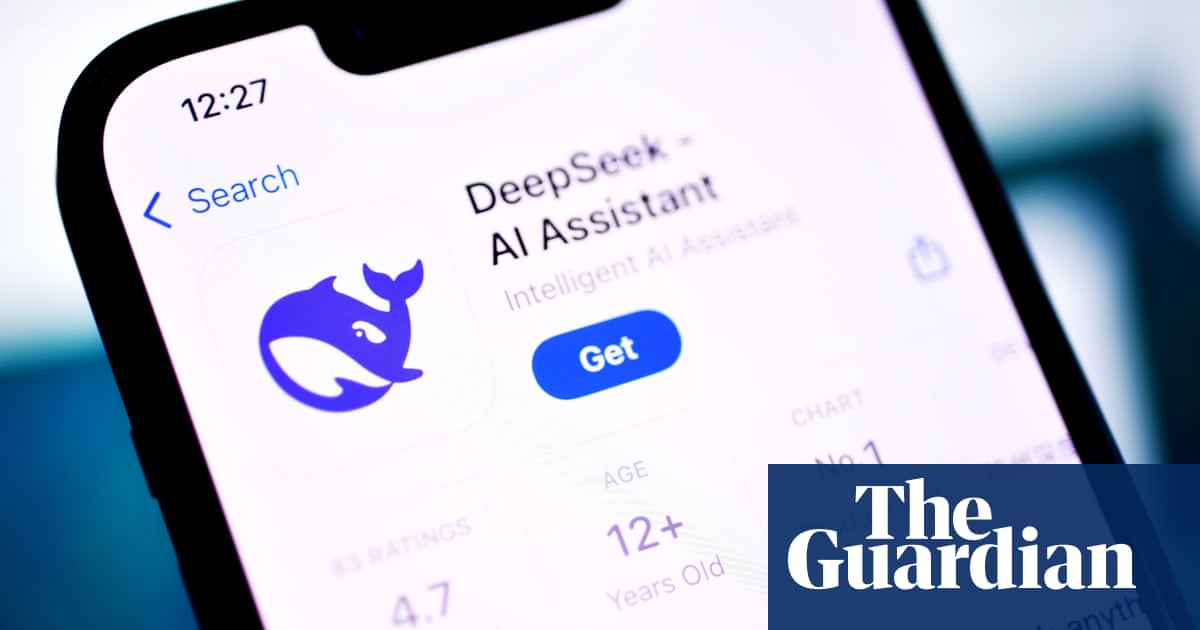Photo credit: www.theguardian.com
Concerns Arise Over Chinese AI Platform DeepSeek
Experts are expressing caution regarding the rapid adoption of DeepSeek, a Chinese artificial intelligence platform. The concerns focus primarily on the potential for misinformation dissemination and the implications of user data being potentially accessed by the Chinese government.
The introduction of this low-cost AI tool has made a significant impact on the stock market, causing a $1 trillion decline in the leading US tech stock index. It has quickly risen to prominence as the most downloaded free application in both the UK and the US. Former President Donald Trump labeled the situation a “wake-up call” for technology companies.
DeepSeek’s ability to perform comparably to established AI platforms like ChatGPT at a minimal cost has surprised many within the tech industry.
Michael Wooldridge, a professor specializing in AI foundations at Oxford University, commented on the implications of using the platform. He suggested that while casual inquiries about topics such as sports history or ancient civilizations are relatively harmless, users should avoid inputting sensitive or private information. “You don’t know where the data goes,” he warned.
Dame Wendy Hall, a member of the United Nations high-level advisory board on artificial intelligence, echoed these concerns, emphasizing that Chinese tech companies must adhere to government regulations. “You can’t get away from the fact that if you are a Chinese tech company dealing with information, you are subject to the Chinese government’s directives,” she stated.
Ross Burley, co-founder of the Centre for Information Resilience, highlighted the potential dangers if such technologies remain unchecked. He noted past instances of the Chinese government utilizing technology to enact surveillance and social control, both within its borders and internationally. “We’ve seen time and again how Beijing weaponizes its tech dominance for surveillance, control and coercion,” he remarked.
The spokesperson for the UK Prime Minister, when questioned about potential uses of Chinese AI technologies within the government, refrained from taking a definitive stance but acknowledged the need for the UK to accelerate innovation in AI.
DeepSeek operates as an open-source platform, allowing developers to modify it for various applications. This feature has generated excitement about ushering in a new era of innovation in artificial intelligence, which many perceive as dominated by US tech firms heavily reliant on substantial investments in infrastructure.
Wooldridge pointed out that the emergence of DeepSeek is a clear signal that China is a competitive force in the AI landscape.
Testing of DeepSeek has revealed limitations, particularly on sensitive subjects like the Tiananmen Square massacre. Inquiries about Taiwan return responses that align with the official stance of the Chinese Communist Party, asserting the island’s status as an “inalienable” part of China.
Hall emphasized that misinformation remains a significant issue in generative AI, indicating that the quality and biases in training data fundamentally shape AI outputs. “The biggest problem with generative AI is misinformation,” she stated, underscoring concerns regarding DeepSeek’s capabilities in this area.
AI expert Azeem Azhar reported his experience using DeepSeek to inquire about the Tiananmen Square events, receiving a response that deemed the subject highly sensitive and often censored. However, the AI also acknowledged the historical context, describing the suppression of the pro-democracy protests and the violent aftermath.
Users interacting with AI tools like DeepSeek may unknowingly expose sensitive documents or communications, as data uploaded can be utilized by the platform’s owners for AI training or other purposes.
Based in Hangzhou, DeepSeek’s privacy policy states that user data is stored on secure servers in China. The platform asserts it collects data to fulfill legal obligations, serve public interests, or protect essential user interests.
Additionally, China’s national intelligence law mandates that all organizations, businesses, and citizens must cooperate with national intelligence efforts, raising further concerns about the implications for user confidentiality and data usage.
Source
www.theguardian.com

